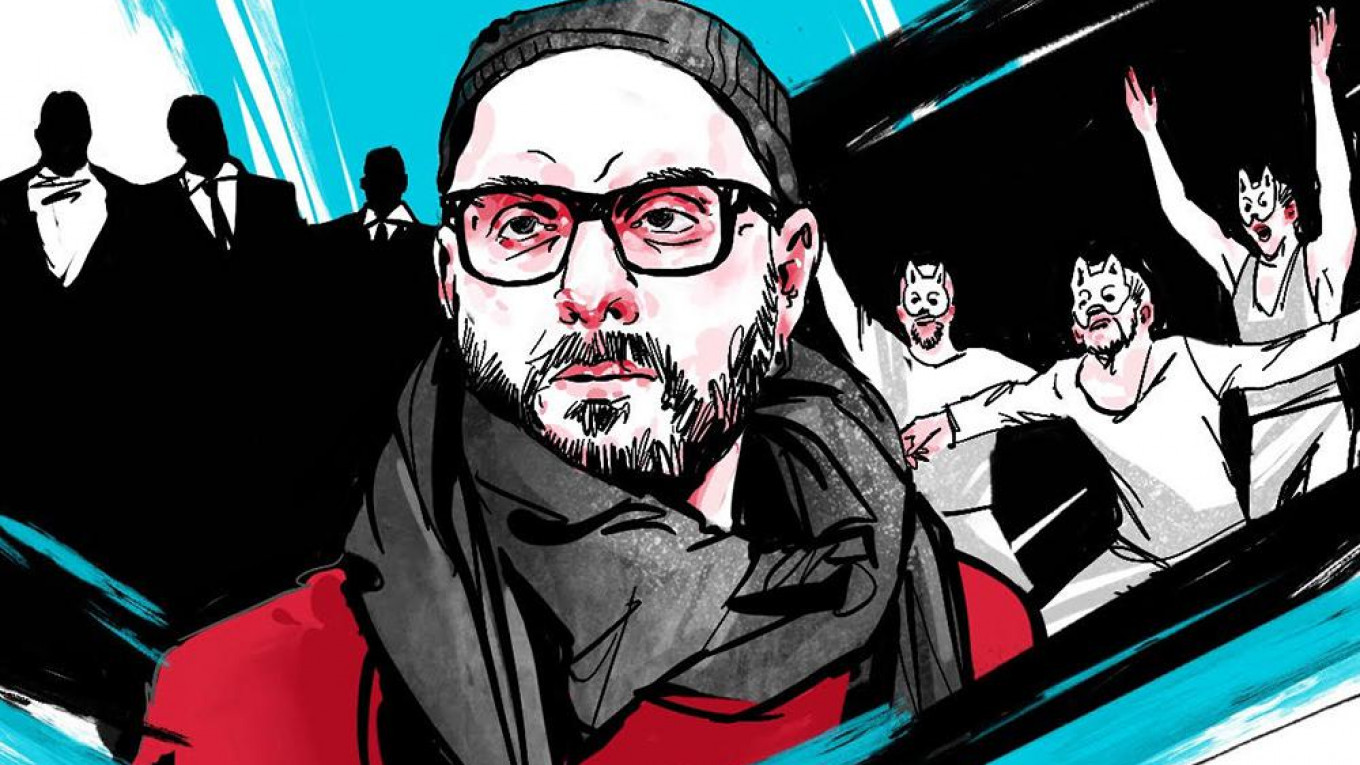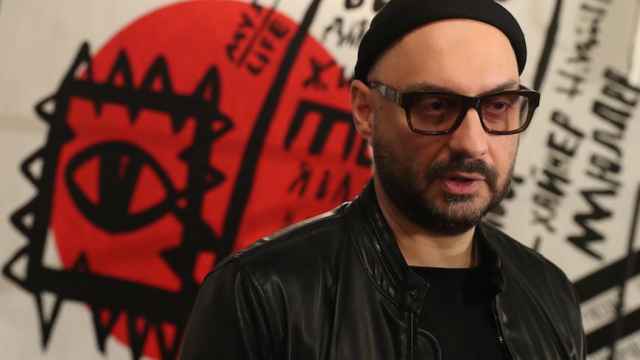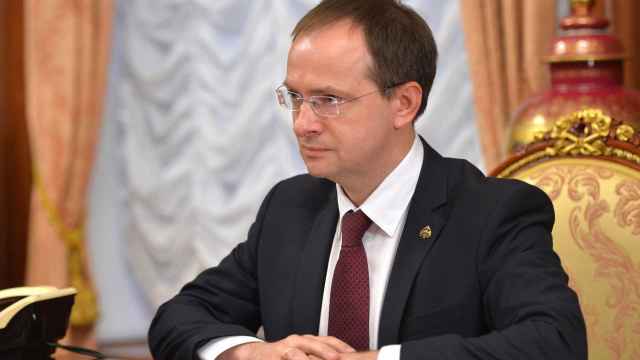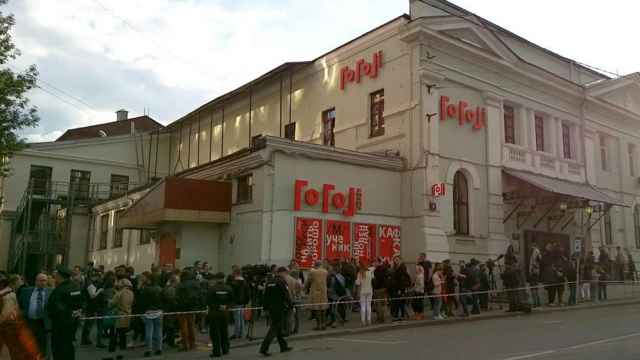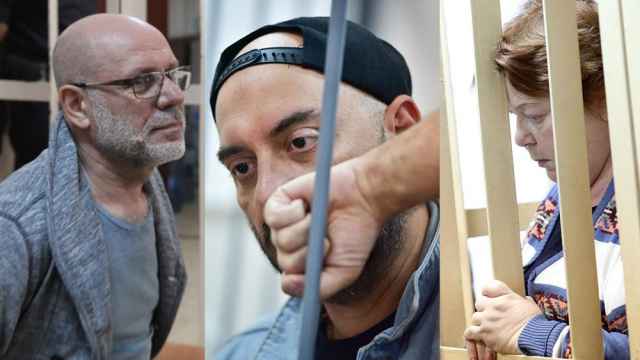The arrest of director Kirill Serebrennikov on Tuesday created a firestorm of reaction in Russia and brought swift response from the West.
The European Film Academy wrote on its website on Wednesday, “There is every reason to believe that Kirill Serebrennikov's arrest is politically motivated and we respectfully call upon the Russian authorities to have the detained released immediately and unconditionally, and to guarantee his free movement and artistic expression.”
The arrest was covered within hours in The New York Times, followed by the BBC, Euronews, the CBC and newspapers in France, Germany, Holland, Spain, Guatemala and other countries.
Approximately 500 protesters appeared outside the Basmanny courthouse in Moscow on Wednesday where the director was arraigned.
The Charges
Serebrennikov’s arrest is the latest development in an affair that went public in late May. At that time, he was questioned about funds allegedly embezzled from theater projects mounted by an entity called Seventh Studio, an offshoot of the Gogol Center, where Serebrennikov has been artistic director since 2013.
Two former Seventh Studio employees, Yury Itin and Nina Maslyayeva, were soon arrested in this case, while a third, former Gogol Center managing director Alexei Malobrodsky, was arrested in late June. The authorities accuse all four of “large scale fraud,” with total amounts reaching approximately 68 million rubles ($1.15 million).
Malobrodsky and Maslyayeva, who reportedly is cooperating with the prosecution, are being held in prison, though no formal charges have been filed against them. Itin is being held under house arrest, as is Serebrennikov at present. He has been confined to house arrest at least until Oct.19, which is his next date in court.
The authorities insist the affair is purely one of finances.
A spokesperson for the prosecutor told the TASS news agency that Serebrennikov had instructed individuals of the Seventh Studio “to enter into fictitious contracts with controlled entities and private entrepreneurs who allegedly fulfilled the obligations associated with the implementation of activities organized by the Platforma project.
Under the guise of payment of these contracts, the money received from the Culture Ministry was withdrawn to the accounts of these counterparties (some were so-called “one-day firms”), cashed and distributed by Serebrennikov among the accomplices.”
This version has found favor among some observers. One was famed film director Andrei Konchalovsky, who asked on Wednesday, “How can we talk about what is just or unjust when we’re not talking about artistic creativity, we are talking about the legality of one or another financial operation?”
“It is silly to mix politics in this,” he added. “What politics? The complaints are not about art. They are in a legal area connected with economics.”
Konchalovsky’s opinion, however, is not shared by many in the cultural community. In fact, his comments suggest he may be ignorant of the rich history leading to the current state of affairs.
Back Story
Serebrennikov debuted in Moscow in 2001 with an acclaimed production of a cutting-edge play called “Plasticine” by the up-and-coming playwright Vasily Sigarev. The play explored violence, homosexual tendencies, and deep, psychic alienation in the life of a young teenager.
This production at the Playwright and Director Center was a landmark production, kicking off a mercurial career for Sigarev, several actors in the cast, and Serebrennikov. Hailed by many as a major artistic achievement, “Plasticine” also attracted sharp voices of dissent.
The production’s challenging themes and its flashy visual style struck doubters as an attack on Russian life, society and tradition. In their point of view, “Plasticine” not only glorified the “dirty” side of Russian life, it flatly rejected the conservative, literary heritage of Russian theater that some still reverently equate with the plays of Anton Chekhov and the legacy of director Konstantin Stanislavsky.
On and Off the Boards
Jump to 2012, by which time Serebrennikov had earned worldwide fame. His own productions abroad, as well as European tours of his Russian works, made him the most acclaimed Russian theater director of his generation. The international respect accorded him increased manifold, thanks to several award-winning films that he made over the years.
And yet — or, perhaps, because of this — Serebrennikov became the target of concerted attacks from cultural conservatives in the fall of 2012 at the very instant he was appointed artistic director of the former Gogol Theater, to be renamed Gogol Center under the new management. Members of the Communist Party and of various religious activist groups raised a ruckus over the director’s “non-traditional” art.
Sit-ins, protests and physical violence accompanied Serebrennikov’s first months at the Gogol Center. Alexei Malobrodsky was attacked and beaten on the street by opponents of the new management.
This only made the director dig in harder. Over the next few years, he unveiled an unusually large number of new shows, most of which relentlessly tackled social ills.
His production of "Idiots" (after Lars von Trier's film) was brash and passionate, suggesting that society must embrace its outsiders. His "Muller Machine" shocked conservatives out of their senses by employing virtually all nude performers.
His staging of Nikolai Gogol's "Dead Souls" was seen by detractors as a high-handed attack on Russian mores and traditions — it “defiled” the classic comedy, they suggested, by showing Russia as a clumsy, drunken nation that would never rise from the mire. Adding insult to injury — horrors! — it included male actors playing women.
Almost invariably, a Kirill Serebrennikov production at Gogol Center puts forth a message of personal and intellectual independence, as well as tolerance for the "other." This has brought down criticism that he is, in some way, not a “real” Russian director and that his allegiance is not with his native culture, but with the “unprincipled”and “promiscuous” West.
One often hears that Serebrennikov is too much at home in “Gay-ropa,” a slur often used by Russian bigots.
Curiously and even incongruously, Serebrennikov flirted briefly with the powers-that-be in the years prior to his appointment to the Gogol Center.
He cultivated what appeared to be a close friendship with Vladislav Surkov, one of Russian President Vladimir Putin’s right-hand men whose divisive, nationalistic philosophy was highly controversial at the time. And he staged a dramatization of “Near Nul,” a novel about Russian skinheads written under a pseudonym that later was revealed to belong to Surkov.
The director’s infatuation with Surkov caused no small confusion in the theater community between 2009 and 2011. Serebrennikov seemed at times to be a political opportunist with a tremendous visual flair for theater.
But be that as it may, he went through a steep maturation curve in his first months and years at Gogol Center. His work at this venue took on an urgency, unity and clarity that it showed only on occasion early in his career.
Through it all, the detractors never let up.
The Politics of Theater
Over the last five years parliamentarians, conservative activists and nationalists have joined repeatedly to abuse and malign Serebrennikov. Kultura and Literaturnaya gazeta, both government newspapers that almost belligerently espouse “traditional ideals,” routinely brand his theater as one “alien to Russian values.”
Critics once again rose up at a dress rehearsal of Serebrennikov’s production of “Nureyev” at the Bolshoi Theater in July. Horrified by photos of the famed ballet dancer Rudolf Nureyev in the nude, as well as a nude actor performing Nureyev, the authorities forced the Bolshoi to postpone, if not ban, the production.
The language used against Gogol Center, its director, and others sympathetic to them is strikingly similar to that which was used during the infamous Purges of the 1930s when dozens of great Russian artists were sent to death in prison camps.
The fact that Serebrennikov once courted favor with those in power only makes the situation more poignant – any historian can tell you that the first individuals wiped out in the Purges were former friends and allies of those who remained in power.
This is precisely what caused famed Russian director Kama Ginkas to struggle angrily for words when asked to comment on Serebrennikov’s arrest by Matters Like That magazine.
“Oh, for F’s sake,” he said. “For F’s sake. That’s my reaction. From there you can decipher numerous phrases in Lithuanian. What can I say? Are we really starting over? Are we really doing this again?”
For the present, Russian artists largely are joining ranks behind Serebrennikov.
But Konchalovsky’s cautious and skeptical words are almost a sure sign that a break will come, dividing artists who have much to lose by opposing the state from those whose conscience will not allow them to do otherwise.
The Theater of Politics
Let us not forget that Russia’s next presidential election will be held in less than a year. And, as happened during the trials of former Russian tycoon Mikhail Khodorkovsky, during the last presidential election, and during the height of the war with Ukraine, large numbers of celebrities will surely take the safe course of supporting the authorities against any perceived opposition.
The Serebrennikov case is one of the biggest of the current era. It is similar in magnitude to the cases against the members of Pussy Riot in 2012 and Khodorkovsky in 2005 and 2010.
And, if it is not clear by now, let me say it in no uncertain terms: The Serebrennikov case is a show trial. That nonsense about finances is precisely that: nonsense.
This trial seeks to stigmatize those who believe in independent thinking and freedom of expression. It seeks to equate an artist with crooks. It seeks to hang a label of corruption on a few individuals who work in a financial system that is, in itself, so flawed and corrupt it cannot possibly be negotiated without crossing the line and letter of the law.
This is not a case of the state seeking to right a wrong. It is a case of the government repressing individuals in an attempt to secure its own future.
John Freedman is an American writer and translator in Moscow and the former theater critic of The Moscow Times.
A Message from The Moscow Times:
Dear readers,
We are facing unprecedented challenges. Russia's Prosecutor General's Office has designated The Moscow Times as an "undesirable" organization, criminalizing our work and putting our staff at risk of prosecution. This follows our earlier unjust labeling as a "foreign agent."
These actions are direct attempts to silence independent journalism in Russia. The authorities claim our work "discredits the decisions of the Russian leadership." We see things differently: we strive to provide accurate, unbiased reporting on Russia.
We, the journalists of The Moscow Times, refuse to be silenced. But to continue our work, we need your help.
Your support, no matter how small, makes a world of difference. If you can, please support us monthly starting from just $2. It's quick to set up, and every contribution makes a significant impact.
By supporting The Moscow Times, you're defending open, independent journalism in the face of repression. Thank you for standing with us.
Remind me later.



